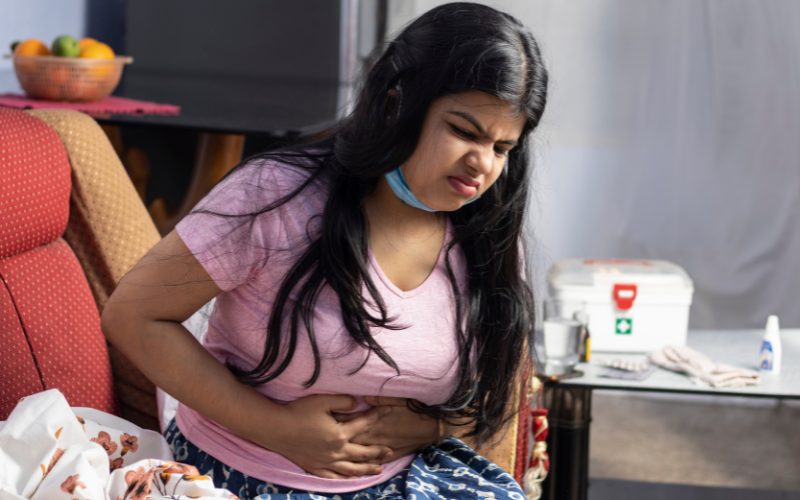Natural Pregnancy: 9 Tips to Help You Conceive!

REVIEWED BY Dr. Lakshita Saini (MBBS, MS Obs & Gynae) on 23 june 2025.
Trying to have a baby but nothing’s working? You’re not alone, and you’re definitely not the only one asking, “Why is this taking so long?”
At Raja Hospital, we meet couples every day who are eager to start a family, but a natural pregnancy feels just out of reach. It’s not always about serious health problems; sometimes, it’s just your body asking for a little more care, balance, and the right timing.
In today’s fast-moving world, things like stress, poor sleep, irregular eating, and even too much screen time can quietly mess with your fertility. The good news? Small changes in your daily routine can make a big difference.
In this blog, we’re sharing 9 simple and natural ways to improve your chances of getting pregnant, no complicated treatments, no harsh medicines. Just smart, body-friendly steps that anyone can follow.
Why Natural Pregnancy Feels So Difficult Today?

Getting pregnant seems like it should be simple, right? But for many couples, it’s become harder than ever, and the reasons might surprise you.
Lifestyle Changes That Sabotage Fertility
Life today is busier, faster, and more exhausting than it used to be. Skipping meals, late-night scrolling, irregular sleep, these habits silently affect the hormones that control your menstrual cycle and ovulation. Over time, your body can struggle to stay in sync.
Environmental and Hormonal Disruptors
From plastic bottles to junk food packaging, everyday items can release chemicals called endocrine disruptors. These can mess with your hormone levels and affect both male and female fertility, often without any obvious symptoms.
The Silent Role of Stress and Sleep
Stress doesn’t just affect your mind; it affects your body too. High stress levels can delay ovulation, disturb hormone production, and reduce your chances of conceiving naturally. Add poor sleep to the mix, and your fertility takes another hit.
But here’s the upside: most of these factors can be improved with a few conscious changes. And that’s what the next section is all about.
Top 9 Natural Ways to Boost Your Pregnancy Chances
Getting pregnant naturally isn’t always about big changes. Sometimes, small daily habits can make a big difference. Here are 9 simple ways to support your body and improve your chances of conceiving.
1. Track Your Ovulation

There are only a few days each month when you’re most likely to get pregnant. This is called your fertile window. Using a period tracking app or ovulation kit can help you figure out the best days to try. Getting the timing right really helps.
2. Eat Hormone-Friendly Foods
The food you eat can affect your fertility. Focus on fresh fruits, leafy greens, whole grains, nuts, seeds, and healthy fats. These foods help balance your hormones. Try to cut down on junk food, sugary snacks, and too much caffeine.
3. Stay Active, But Keep It Light

Moving your body helps with blood flow and hormone health. Light exercises like walking, yoga, or stretching are great. Avoid overexertion with intense workouts, as this can sometimes disrupt your cycle.
4. Manage Your Stress
Stress can quietly interfere with your hormones. Try to include some calming activities in your day. Deep breathing, listening to music, or taking quiet breaks can help you feel more relaxed and centered.
5. Get Quality Sleep

Sleep affects everything, including your fertility. Aim for 7 to 8 hours of sleep each night and try to keep a regular bedtime. Your body does a lot of healing and hormone work while you rest.
6. Drink Enough Water
Staying hydrated is important for overall health and fertility. It also helps your body produce healthy cervical mucus, which helps sperm travel to the egg. Try to drink at least 8 glasses of water each day.
7. Avoid Harmful Habits

Habits like smoking, drinking alcohol, and heating food in plastic containers can affect your fertility. Try to reduce or avoid these as much as possible.
8. Look Into Fertility-Friendly Supplements
Some vitamins and minerals can support fertility, like folic acid, vitamin D, and zinc. But always talk to a doctor before starting any supplements to make sure they’re safe and helpful for you.
9. Stay Emotionally Connected

Fertility can feel like a tough journey, so it’s important to support each other. Talk to your partner, share your feelings, and be kind to yourself. A healthy emotional space makes a big difference, too.
What’s Silently Affecting Your Natural Pregnancy Chances
Sometimes, even when everything seems fine on the surface, a few hidden factors might be getting in the way of a natural pregnancy. Let’s look at what could be going on behind the scenes.
Delaying Pregnancy Until Later in Life
Many couples today choose to start a family later in life. Careers, financial planning, or simply not feeling ready earlier are common reasons. But as we age, fertility naturally starts to slow down. This is especially true for women after the age of 35, when both the number and quality of eggs begin to decline.
Health Issues That Go Unnoticed

Conditions like PCOS, thyroid problems, or hormonal imbalances often go undiagnosed for years. They don’t always show strong symptoms but can quietly affect ovulation and hormone health. If your periods are irregular or you’ve been trying for a while without success, it might be time to get these checked.
Too Much Time on Screens
This one might surprise you. Spending hours on your phone, laptop, or TV affects more than just your eyes. Excess screen time can disrupt your sleep, stress levels, and even your body’s hormone rhythm. It also reduces time spent outdoors, which is important for vitamin D levels and mental well-being.
These factors don’t mean something is wrong with you. But understanding them helps you take better control of your fertility journey.
Common Myths About Natural Pregnancy

There’s a lot of information out there about getting pregnant, but not all of it is true. Let’s clear up a few common myths.
Myth 1: You can get pregnant any time during your cycle
Not true. There’s only a small window during your cycle when you’re most fertile. This usually happens around 12 to 16 days before your next period.
Myth 2: If you’re healthy, you’ll get pregnant quickly
While good health supports fertility, it doesn’t guarantee quick results. Many healthy couples take several months to conceive naturally.
Myth 3: Only women have fertility issues
Fertility is not just about women. Men contribute to about 40 percent of fertility challenges. That’s why both partners should be involved in the process.
Myth 4: Stress alone can stop pregnancy
Stress affects your hormones and can delay ovulation, but it’s rarely the only reason someone can’t get pregnant. It’s one part of a bigger picture.
Daily Habits That Support Fertility

Adding a few healthy habits to your routine can help your body get ready for pregnancy naturally and gently.
Start your day with a healthy breakfast
Skipping breakfast or eating sugary snacks can mess with your blood sugar and hormones. Try a balanced breakfast with protein, fruits, and whole grains.
Get natural sunlight every day
Just 15 to 20 minutes of sunlight can help boost your vitamin D levels, which is important for fertility.
Limit screen time at night
Too much screen time before bed affects your sleep and hormone balance. Try to switch off phones or TVs at least 30 minutes before sleeping.
Stay consistent with your routine
Your body loves routine. Try to sleep, eat, and move around at the same times each day to help your hormones stay in sync.
When to Consult a Fertility Expert?

Trying naturally is the first step, but sometimes you might need a little expert help to guide you forward. Knowing when to reach out can save you time, stress, and confusion.
Signs It Might Be Time to Get Help
If you’ve been trying to conceive for over a year (or six months if you’re over 35) without success, it’s a good idea to consult a doctor. Also, if your periods are irregular, very painful, or sometimes don’t come at all, these could be signs that your body needs a little support.
Other signs include past miscarriages, existing health conditions like PCOS or thyroid issues, or simply having a gut feeling that something isn’t right.
How Raja Hospital Can Support You
At Raja Hospital, our team listens, understands, and works with you to create a plan that suits your body and goals. Our experienced gynaecologist, Dr. Lakshita Saini, along with our full women’s care team, helps couples every day who are on this same journey.
We’re here not just with medical advice, but with the emotional support and personal attention that makes a real difference. Even one conversation can clear doubts and show you a better path forward.
Frequently Asked Questions
1. How long should we try naturally before seeing a doctor?
If you’re under 35 and have been trying for a year without success, it’s time to talk to a doctor. If you’re over 35, you should consider getting help after six months of trying.
2. Can stress really stop me from getting pregnant?
Yes, high stress can affect your hormones and delay ovulation. While stress alone doesn’t cause infertility, it can make it harder for your body to stay in balance.
3. Does age affect natural pregnancy?
Yes, fertility naturally decreases with age, especially after 35. But many women still conceive naturally in their late 30s or even early 40s, especially with healthy lifestyle choices and early support.
4. What foods help with fertility?
Fertility-friendly foods include leafy greens, berries, whole grains, nuts, seeds, and healthy fats like olive oil. These support hormone health and improve egg quality.
5. Can men also have fertility issues?
Absolutely. In about 40% of cases, fertility challenges involve the male partner. That’s why both partners need to get checked if pregnancy is taking longer than expected.
Struggling with same?
Book Your Appointment With Our Expert Doctors

Conclusion
Trying to conceive naturally can bring a mix of hope, confusion, and sometimes disappointment. But the important thing to remember is that you’re not alone, and you’re not doing anything wrong. Your body is complex, and so is the process of creating life.
The good news is that with a few intentional changes to your daily routine, you can give your body the support it needs. Tracking your cycle, eating nourishing foods, reducing stress, getting good sleep, and breaking small unhealthy habits can all add up to make a real difference.
It’s also okay to feel overwhelmed at times. This journey isn’t always quick or predictable. Be kind to yourself and don’t hesitate to reach out for expert guidance when you need it.
If you’re unsure where to start or need a bit of clarity, a quick visit to Raja Hospital could help you take the next right step. Schedule a visit with a fertility expert, Dr. Lakshita Saini, at Raja Hospital to get personalized support.
